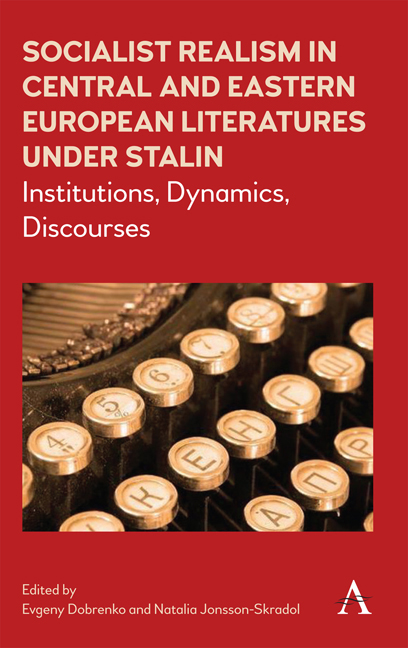 Socialist Realism in Central and Eastern European Literatures under Stalin
Socialist Realism in Central and Eastern European Literatures under Stalin Book contents
- Frontmatter
- Contents
- Acknowledgements
- Introduction
- Part 1 Institutions
- 1 How Socialist Realism Was Exported to Eastern European Countries and How They Got Rid of It
- 2 Literary Monopolists and the Forging of the Post–World War II People's Republic of Letters
- 3 Once Dr Faul Has Left: The Agony of Socialist Realism in Poland, 1955–56
- 4 From Literature Censored by Poets to Literature Censored by the Party: Censorship in the Czech Literary Culture of 1945–55
- 5 The Demise of ‘Socialist Realism for Export’ in 1947: VOKS Receives John Steinbeck and Robert Capa
- 6 The Soviet Factor and the Institutionalization of Bulgarian Literature after World War II
- 7 Cultural Renewal in Eastern Germany – Mission Impossible for Soviet Cultural Officers and German Anti-Fascists?
- Part 2 Dynamics
- Part 3 Discourses
- Conclusion
- List of Contributors
- Index
3 - Once Dr Faul Has Left: The Agony of Socialist Realism in Poland, 1955–56
from Part 1 - Institutions
Published online by Cambridge University Press: 10 May 2018
- Frontmatter
- Contents
- Acknowledgements
- Introduction
- Part 1 Institutions
- 1 How Socialist Realism Was Exported to Eastern European Countries and How They Got Rid of It
- 2 Literary Monopolists and the Forging of the Post–World War II People's Republic of Letters
- 3 Once Dr Faul Has Left: The Agony of Socialist Realism in Poland, 1955–56
- 4 From Literature Censored by Poets to Literature Censored by the Party: Censorship in the Czech Literary Culture of 1945–55
- 5 The Demise of ‘Socialist Realism for Export’ in 1947: VOKS Receives John Steinbeck and Robert Capa
- 6 The Soviet Factor and the Institutionalization of Bulgarian Literature after World War II
- 7 Cultural Renewal in Eastern Germany – Mission Impossible for Soviet Cultural Officers and German Anti-Fascists?
- Part 2 Dynamics
- Part 3 Discourses
- Conclusion
- List of Contributors
- Index
Summary
Literary Practice
The Polish ‘Thaw’ followed the same trajectory as the Soviet one, except that it moved faster, was more radical and its criticism of Stalinism was more public. However, the euphoria after the III Plenum of the Polish United Worker's Party (21– 24 January 1955), which strengthened the emerging reformist movement within the party, was quickly silenced by loud calls to stop ‘the dismantling of socialism’. Just a few months later the limits of liberalization became clear. When the chairman of the Polish Writers’ Union Jerzy Putrament spoke at the enlarged Plenum of the Executive Board of the Polish Writers’ Union on 10– 11 July 1955, he emphasized the danger of ‘bourgeois relapses’. He also warned that ‘there are still those in our midst who are trying to push for quite a particular understanding of the significance of the III Plenum for our cultural policy, using it as an excuse to plead for the possibility and necessity of reviving various principles which we have already outlived. We must state with full determination and unambiguously that those who are looking to find in the Third Plenum evidence of some “cultural NEP”, of some “cultural reprivatisation”, are wrong’.
Putrament had no doubts as to ‘the political agenda behind the campaign which is allegedly just a criticism of artistic defects’, or as to the fact that ‘this ideologically subversive activity [was] targeting those writers who are doing their best to break out of the bourgeois quasi- intellectual milieu, to become engaged in the active life of our country’. The ‘ideologically subversive activity’ was about false generalizations. As Stefan Żółkiewski said at the same event: ‘Now they don't stop at saying that socialist realist works are weak; they go further and try to prove that such works are bound to be weak. We've reached the stage of a general negation’. The attentive guards of the ideology saw manifestations of this ‘stage of general negation’ everywhere. For example, ‘a nihilistic assessment of the artistic heritage of the past decade is a manifestation of bourgeois ideology’. Accordingly, ‘the editorial boards of our journals have no right to serve like seismic detectors’. The purpose of any literary journal published by the PWU was to express the principles of party- mindedness, to fight against reactionary ideology.
- Type
- Chapter
- Information
- Socialist Realism in Central and Eastern European Literatures under StalinInstitutions, Dynamics, Discourses, pp. 39 - 60Publisher: Anthem PressPrint publication year: 2018


